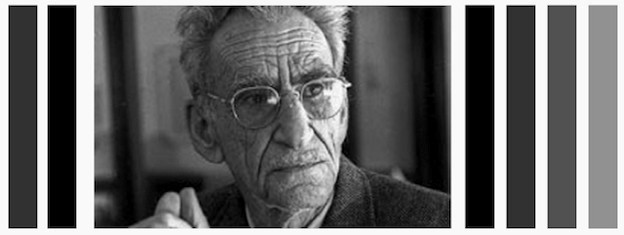Norman Finkelstein: 'Oppen at Altamont'

I
Thrownness he calls it
And indeed “everyone
turned very sharply
into himself or herself.
Kind of a masturbatory
atmosphere.”
And the music—
something we had never
heard before though surely
it had been heard before
long ago “the songs…
are no one’s own”
Not his, surely not
his. In red and black
this medieval prince,
troubador of darkness,
self-appointed but
delegated—allow me
to introduce him as he
introduced himself
Easy as
pie? No!
because it
is witnessed
we witness
ourselves as
he witnesses
himself there
in the cutting
room
“obscured by their long hair they seem
to be mourning”
But this is not prophecy
“on the massive spike the song
clangs”
A spike not
a knife though one
may lead inevitably
to the other
For one sees it in their eyes,
their homely faces
The girl cannot stop weeping
and the boy in the cap
looks up at him shaking his head
knowing that something has gone
terribly wrong
But to what degree
does one withdraw from the stage?
Oppen cancels his reading tour—
“woke up one night in the absolute certainty
that I could not do it…
cannot, cannot, perhaps particularly
with the expansion of voice in Numerous
I cannot make a Chatauqua of it,
cannot put myself so thoroughly INTO it,
like a Ginsberg.”
Who appears innocuous
however unleashing
energies comparable
to what we see
on the screen
Who once invited
the Angels to
a Dylan concert, calling
them “our outlaw
brothers of the
counterculture”
The roiling mass
and the naked woman
cannot be otherwise
than a Bacchante
her rounded flesh lifted
up and set back into
the crowd by the Angels
whose chief looks on
at Jagger singing—
products and producers
of such powers
While the meditative man
confirms his failure
his victory in retreat
to “honorably keep
His distance
If he can.”
The populist caught
between the Old and New
past and present
The crowd, the “people”
organized by a vanguard
or newly individuated
always at risk
as power is unleashed
Jagger helpless onstage:
“If we are one
let’s show
we’re all one”
What, what,
we asked each other
on the way to the museum,
were they doing there?
“It was necessary to park
one’s car and walk a mile.
Nobody looked at my wife and me”
Yet how odd they must have seemed
to any of the festive youth
unstoned and thoughtful
there among “the irrigation
canals” “walking under the high-
tension wires over the brown hills”
And Charlie Watts,
backbone of the band,
stares out in reverie,
murmuring of the way
the Angels cleared the path
to the stage
Only much later
are we shown
the biblical painting
the crowd parting
as the bikes roar through
In the computer’s freeze-frame
it seems like Oppen’s
migratory vision
“the wounds untended
and the voices confused”
turned to nightmare
At the press conference in
some uncharted space
between naiveté and cynicism
Jagger speaks of “a sort
of microcosmic society
which sets an example to
the rest of America
as to how one can behave
in large gatherings.”
Yet for Oppen too
“The Students Gather”:
“I too agree
We are able to live
Only because some things have been said”
But who would not hesitate
to speak
knowing all
speech may be corrupted?
To identify death
with a kind of ecstasy
so that the crowd
takes over in a darkness
closely akin to joy
Words lost
in what he knew to be
an endangered, dangerous
show
Not “the shuffling of a crowd”
nor the ball game’s argument
not even Williams’ crowd
seen as “beautiful,” “venomous”
“deadly, terrifying”
“I know, of course I know, I can enter no other place”
II
The space of possibility
is always limited:
the past is
because it has been
insofar as we
have been thrown
insofar as we
are fallen
insofar as we
may project ourselves
forward
Always at some point
they are running
from or toward
the helicopters
The Stones and
their entourage
lifted up and away
from disaster
Or the fall of Saigon
reenacted endlessly
in a musical
Troopers playing
the same old songs
Oppen feels the wind
blowing through the century
The Collected Poems arrives—
the Angel of History in a cardigan
at the end of the continent
dissolving into language
And that sickening acceleration
that no poem may stop
No arbitrary freeze-frame
neither the Maysles nor mine
can prevent this passage
Poised to leave
Jagger stares out at us forever
Let him go
The storm kicks up
the credits roll
We almost expect to see them
walking back toward the car
Author’s note on “Oppen at Altamont”: George and Mary Oppen attended the Rolling Stones concert at Altamont on December 6, 1969; Oppen later wrote about the experience in his sequence Some San Francisco Poems. My poem quotes from the first poem in that sequence, as well as from the poems “Of Being Numerous” and “The Students Gather,” from Oppen’s interview with David Gitin in Ironwood 5, and from his letter to Charles Tomlinson (Oct. 1969) in the Selected Letters. I also draw on images and lines of dialogue from Gimme Shelter (1970), the Maysles Brothers documentary of the Rolling Stones tour that culminated with the Altamont concert. Additionally, the poem alludes to Heidegger’s philosophy (Oppen read Heidegger closely), specifically his notion of “thrownness.” The poem first appeared in Smartish Pace 16 (April 2009).
Poems and poetics